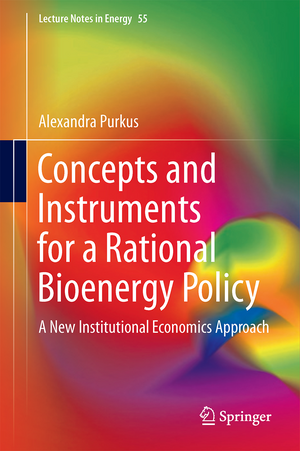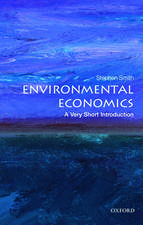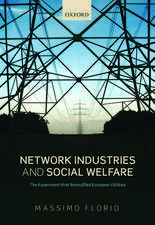Concepts and Instruments for a Rational Bioenergy Policy: A New Institutional Economics Approach: Lecture Notes in Energy, cartea 55
Autor Alexandra Purkusen Limba Engleză Hardback – 22 iun 2016
| Toate formatele și edițiile | Preț | Express |
|---|---|---|
| Paperback (1) | 646.62 lei 6-8 săpt. | |
| Springer International Publishing – 31 mai 2018 | 646.62 lei 6-8 săpt. | |
| Hardback (1) | 653.00 lei 6-8 săpt. | |
| Springer International Publishing – 22 iun 2016 | 653.00 lei 6-8 săpt. |
Din seria Lecture Notes in Energy
-
 Preț: 436.35 lei
Preț: 436.35 lei - 15%
 Preț: 655.60 lei
Preț: 655.60 lei - 18%
 Preț: 952.09 lei
Preț: 952.09 lei - 18%
 Preț: 1012.84 lei
Preț: 1012.84 lei - 15%
 Preț: 635.80 lei
Preț: 635.80 lei - 15%
 Preț: 645.96 lei
Preț: 645.96 lei - 15%
 Preț: 645.47 lei
Preț: 645.47 lei - 15%
 Preț: 640.06 lei
Preț: 640.06 lei - 15%
 Preț: 649.71 lei
Preț: 649.71 lei - 15%
 Preț: 643.84 lei
Preț: 643.84 lei - 18%
 Preț: 954.31 lei
Preț: 954.31 lei - 15%
 Preț: 643.84 lei
Preț: 643.84 lei - 18%
 Preț: 949.73 lei
Preț: 949.73 lei - 18%
 Preț: 1411.69 lei
Preț: 1411.69 lei - 15%
 Preț: 634.18 lei
Preț: 634.18 lei - 15%
 Preț: 649.87 lei
Preț: 649.87 lei - 15%
 Preț: 642.03 lei
Preț: 642.03 lei - 18%
 Preț: 957.62 lei
Preț: 957.62 lei - 15%
 Preț: 652.49 lei
Preț: 652.49 lei - 18%
 Preț: 963.15 lei
Preț: 963.15 lei -
 Preț: 361.03 lei
Preț: 361.03 lei -
 Preț: 391.79 lei
Preț: 391.79 lei - 15%
 Preț: 646.11 lei
Preț: 646.11 lei -
 Preț: 394.29 lei
Preț: 394.29 lei -
 Preț: 391.22 lei
Preț: 391.22 lei - 18%
 Preț: 954.45 lei
Preț: 954.45 lei - 18%
 Preț: 957.62 lei
Preț: 957.62 lei - 15%
 Preț: 647.27 lei
Preț: 647.27 lei - 18%
 Preț: 960.30 lei
Preț: 960.30 lei - 18%
 Preț: 1250.74 lei
Preț: 1250.74 lei - 15%
 Preț: 642.18 lei
Preț: 642.18 lei - 15%
 Preț: 639.41 lei
Preț: 639.41 lei -
 Preț: 488.71 lei
Preț: 488.71 lei - 18%
 Preț: 1677.21 lei
Preț: 1677.21 lei
Preț: 653.00 lei
Preț vechi: 768.23 lei
-15% Nou
Puncte Express: 980
Preț estimativ în valută:
124.97€ • 129.99$ • 103.17£
124.97€ • 129.99$ • 103.17£
Carte tipărită la comandă
Livrare economică 14-28 aprilie
Preluare comenzi: 021 569.72.76
Specificații
ISBN-13: 9783319311340
ISBN-10: 3319311344
Pagini: 380
Ilustrații: XVII, 404 p. 18 illus., 6 illus. in color.
Dimensiuni: 155 x 235 x 24 mm
Greutate: 0.77 kg
Ediția:1st ed. 2016
Editura: Springer International Publishing
Colecția Springer
Seria Lecture Notes in Energy
Locul publicării:Cham, Switzerland
ISBN-10: 3319311344
Pagini: 380
Ilustrații: XVII, 404 p. 18 illus., 6 illus. in color.
Dimensiuni: 155 x 235 x 24 mm
Greutate: 0.77 kg
Ediția:1st ed. 2016
Editura: Springer International Publishing
Colecția Springer
Seria Lecture Notes in Energy
Locul publicării:Cham, Switzerland
Cuprins
1 Introduction.- 2 Allocative Challenges of Bioenergy Use.- 3 Implications of Economic Theory for Bioenergy Policy Design.- 4 The Case of German Bioenergy Policy.- 5 Towards a Rational Bioenergy Policy Concept.- 6 Conclusion.- References.
Recenzii
Notă biografică
Alexandra Purkus is an economic researcher at the Helmholtz Centre for Environmental Research – UFZ. She holds a Diploma in Economics with an Environmental Focus from the Carl von Ossietzky Universität Oldenburg, Germany, and a Master of Science by Research in Global Environmental Change from the University of Edinburgh, UK. At the UFZ, Alexandra Purkus wrote her doctoral thesis as part of an interdisciplinary working group on bioenergy systems analysis, in cooperation with the Deutsches Biomasseforschungszentrum (DBFZ) and the University of Leipzig. Currently, her research focuses on renewable energy policy design and governance challenges of transitioning to a bioeconomy.
Textul de pe ultima copertă
This book provides an in-depth economic analysis of the challenges associated with bioenergy use and production. Drawing on New Institutional Economics and the theory of economic policy, it develops theory-based recommendations for a bioenergy policy that strives for efficiency and sustainability. Further, it shows how to deal with diverse uncertainties and constraints, such as institutional path dependencies, transaction costs, multiple and conflicting policy aims, and interacting market failures, while also applying the resulting theoretical insights to a case study analysis of Germany’s bioenergy policy. As such, the book aims to bridge the gap between practical bioenergy policymaking on the one hand, and neoclassical theory-based concepts that strictly focus on a minimization of greenhouse gas mitigation costs on the other.
Caracteristici
Provides an in-depth economic analysis of the challenges associated with bioenergy use and bioenergy policymaking Develops an analytical framework for the derivation of bioenergy policy recommendations Highlights a case study analysis of Germany’s bioenergy policy















